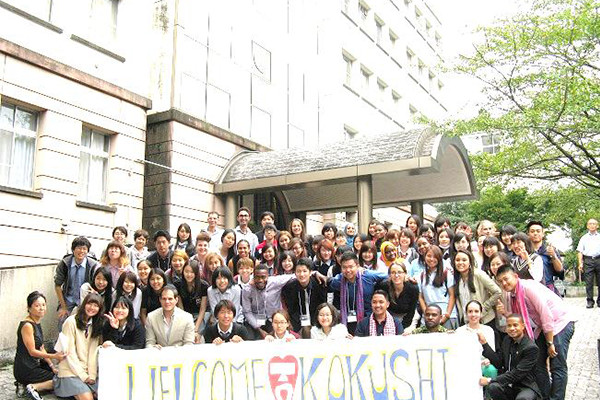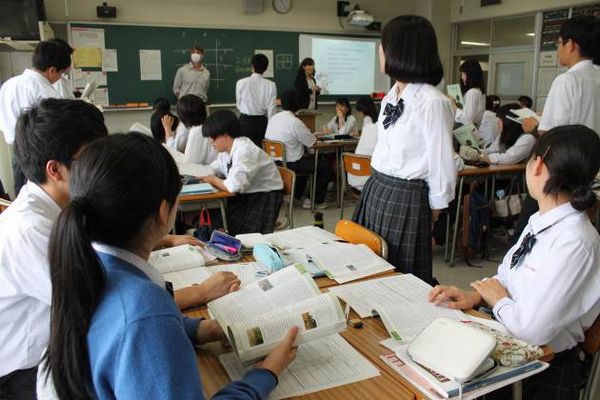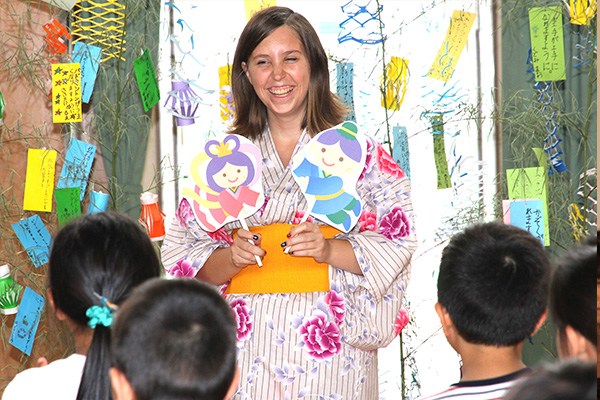About JET
The JET Program (The Japan Exchange and Teaching Programme) is undertaken by local governments under the collaboration of the Ministry of Internal Affairs and Communications (MIC), the Ministry of Foreign Affairs, the Ministry of Education, Culture, Sports, Science and Technology (MEXT), and the Council of Local Authorities for International Relations (CLAIR).
The JET Program invites youths from abroad to engage in cultural exchange activities and foreign language education at local governments, boards of education, and elementary, junior high and high school institutions, with the goal of promoting grassroots internationalization on the regional level. From the outset, the program has been highly valued as a large-scale people-to-people exchange from countries around the world. Participants and Japanese people from each region involved with the program craft international networks, with the expectation of plentiful gains for the international community.
The Tokyo metropolis expanded the number of JET participants dispatched in the city from the 2014 fiscal year. 100 ALTs were employed and dispatched to metropolitan senior high schools in fiscal year 2014, and 200 ALTs in fiscal year 2015.
 (External link)
(External link)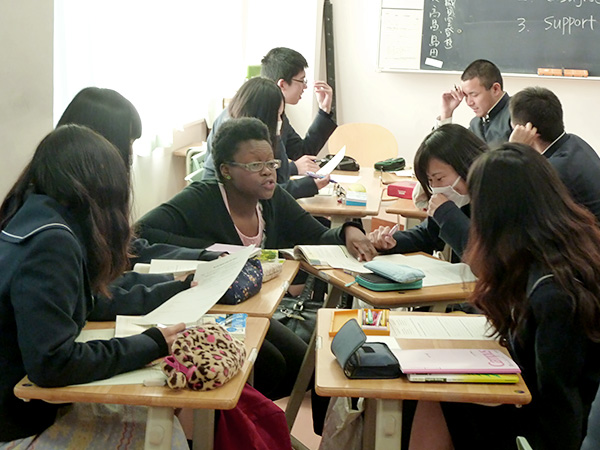
About ALTs
Assistant Language Teachers (ALTs) are foreign nationals serving as English education assistants.
JET ALTs are native English instructors, and all academic years of Tokyo metropolitan high schools receive guidance from a native speaker on a weekly basis.
Here, we will introduce various activities undertaken by JET ALTs.
English Lessons
Lessons are carried out in cooperation between the Japanese teachers of English and JET participants. Through various lesson styles and interviews, we will introduce the appeal and effectiveness of JET-incorporated lessons.
Multifarious Activities
JET's appeal doesn't stop at English instruction. We will introduce the wide array of activities they participate in.
JET-Focused Training
All JET participants undergo training held by the Tokyo Metropolitan Board of Education. There are two types of training: post-arrival training and teaching ability improvement training.
Post-Arrival Training
Immediately after arriving in Japan, JETs receive training on the Tokyo education system, as well as knowledge and guidance on living in the area. Not only does this training aim to improve teaching ability, but it also allows a smooth start to life in Japan and work in schools.
The main content is as follows.
Post-Arrival Training Outline
Training Details
Life in Japan
- Matters related to life in Japan (using public transportation, emergency disaster procedures, etc.)
- Matters related to residence in Japan and Japanese culture
- Japanese lessons
Working in Schools
- Matters related to senior high school curricula and school life
- Tokyo education policy and challenges
- Fieldwork (experiential training at the Life Safety Learning Center and Edo-Tokyo Museum)
Improving Teaching Ability
- Lectures, practical presentations, panel discussions, group discussions from senior JETs
Etc.
After a 7-day training session that takes place at the Tokyo Metropolitan Board of Education upon arrival in Japan, JETs go to teach at their dispatch schools.
First, we will introduce a practical presentation and panel discussion held by a 3rd year JET as part of the post-arrival training for JETs that arrived in July/August 2016.
Presenter: Allison Palmer
American
3rd year dispatched to Tokyo Metropolitan Shinjuku High School.
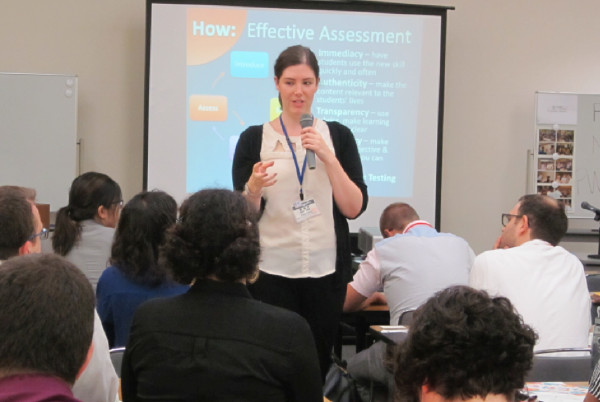
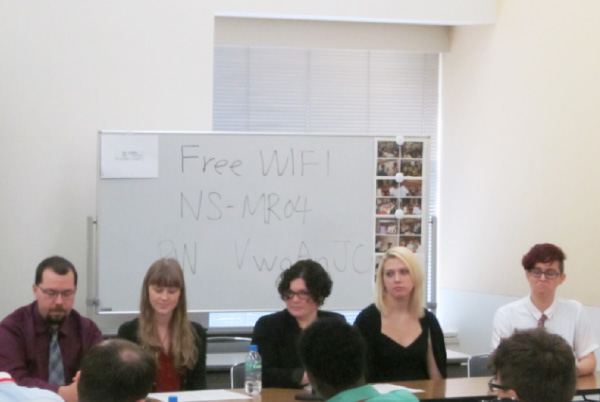
The methods introduced to communicate with students and effective teaching methods are based on their own experiences.
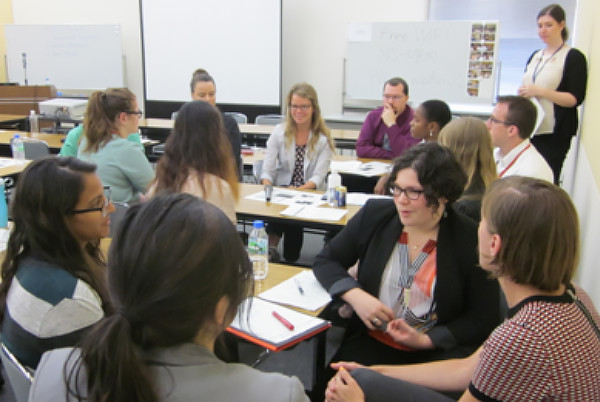
New JET:
What should I do to communicate actively with students?
Senior JET:
Ask each student about their hobbies and interests. It is important to be habitually proactive in talking with them, and to understand who you're talking to. For example, finding a common point of interest, like something you both like, will allow students to open their hearts to you.
New JET:
Did anything about Japanese high school students surprise you?
Senior JET:
Japanese high school students not only study, but also put their energy into club activities, making them busier than students where I come from (America). Outside of class time, you can talk to them in the hallways, participate in club activities, and increase contact with your students.
After the 7-day post-arrival training, JETs engage in student education at their schools through English lessons and extracurricular activities.
Teaching Ability Improvement Training
Every year, JETs are required to participate in training lectures that, in addition to conveying the knowledge and teaching skills necessary for effective language instruction, cultivate understanding of issues related to foreign language education, and in doing so, aim to improve their teaching ability.
The main content is as follows.
Teaching Ability Improvement Training Outline
Training Details
Improving Teaching Ability
- Keynote speeches (effective team teaching, role of the ALT)
- Practical example presentations (effective language activities, effective team teaching)
- Skill exercises (communication skill instruction and valuation, vocabulary instruction, instruction integrating the 4 Language Skills, student motivation)
Working in Schools
- Lectures (English education, international understanding education, cultivation projects for abilities and attitudes that transmit Japanese traditions and the merits of Japanese culture)
- Tokyo human rights education (connection with students, classroom environment, document preparation, personal information)
- Case studies (communication with faculty members, etc.)
- Outside of the classroom (school events, club activities, participation in other functions)
- Instruction in extracurricular activities (club activities, school events, publicity activities, regional events, etc.), etc.
Etc.
Next, we will introduce part of the Teaching Ability Improvement Training carried out in January 2016.
In the Teaching Ability Improvement Training, JETs engaging in student education at their schools habitually gathered to share effective team teaching practices, and to learn about such subjects as language activity instruction combining the 4 Language Skills, or JET-related issues and resolution plans.
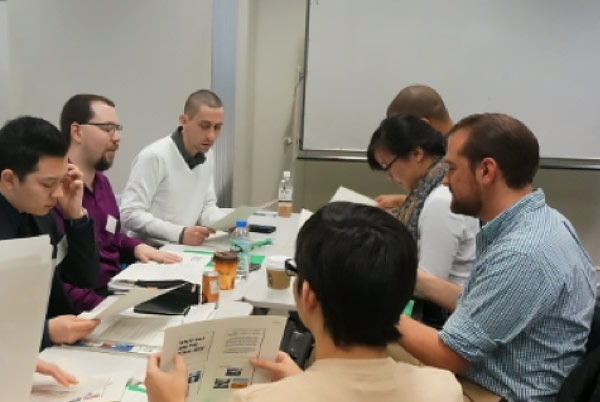
In a keynote speech to understanding effective team teaching and ALT duties, Neil DeMaere, vice director of the English Language Education Council (ELEC) lecture management division held a lectures under the theme "A Survey of ELT Approaches / Methods and their Application in the Classroom".


